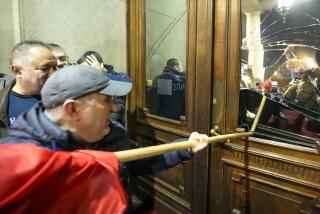Serbia reelects pro-West president
BELGRADE, SERBIA — A bitterly divided Serbia voted for president Sunday, reelecting by a narrow margin the pro-West incumbent over a radical nationalist, electoral officials said.
At stake in the election was the pace of change in a country that has undergone enormous transformation since the ousting of dictator Slobodan Milosevic more than seven years ago. It was also a referendum on how newly democratic parties have managed the country during that tumultuous period.
Serbs voted as its southern province of Kosovo, dominated by ethnic Albanians and controlled by the United Nations, prepares to declare independence -- a prospect with the potential to destabilize the region a decade after war tore it to shreds.
There were fears that an extreme nationalist in the presidential office would only inflame tensions over Kosovo’s secession, which the U.S. has said it will support.
A near-record turnout, projected to top two-thirds of the electorate, gave about 51% of the vote to Boris Tadic of the moderate Democratic Party, according to partial but definitive results. He defeated Tomislav Nikolic of the Radical Party, whose leader is on trial at The Hague for alleged war crimes. Nikolic took about 47% of the vote, election officials said.
Full results are expected today.
Tadic claimed victory Sunday night, addressing crowds from the balcony of his downtown party headquarters as a Gypsy brass band played out front and fireworks streaked the sky. Supporters poured into the streets, waving flags and blasting car horns.
“Serbia has shown its great democratic potential,” the silver-haired Tadic proclaimed. “A lot of people tried to trip us up from all sides of the world. In spite of that, we want our place in Europe.”
Nikolic gave something close to a concession, saying he would await the final returns. “I am prone to conclude that Boris Tadic is most probably the winner,” he said at the somber headquarters of his party in a Belgrade suburb.
In their campaigns, Tadic and Nikolic adamantly opposed the loss of Kosovo. However, Nikolic had suggested tougher responses, including the severing of diplomatic ties with countries that recognize the province’s sovereignty. Washington will lead the charge to recognize independence for Kosovo.
Tadic was a firm proponent of Serbia’s aligning itself with the European Union as a way of securing the country’s future. He warned that giving the Radicals the presidency could return Serbia to its dark past as a pariah.
Nikolic advocated some conditional cooperation with Europe but looked more enthusiastically toward the nation’s traditional ally Russia, capitalizing on the feeling among many Serbs that the West has betrayed them.
Many here reacted with relief that Nikolic was defeated but noted that the Radical Party, if final results are confirmed, won more votes than it had in any previous election.
Analysts cautioned that the people who voted for Nikolic should not be considered warmongers or even particularly radical. Many are disillusioned by Serbia’s move to democracy because they feel left behind, unable to benefit from the free market. They are the so-called losers in transition, a disaffected group that has emerged in much of the former Soviet bloc.
“It is unacceptable to consider that 2 million people who voted for Nikolic are extremist Serbian nationalists,” said Goran Svilanovic, a former foreign minister who works at a think tank promoting Balkan stability. “They are not haters of other peoples. They are people who are not satisfied with the arrogance of the government and are unsatisfied with the corruption and the way the government has handled” the poor and unemployed.
Still, the campaign exposed two Serbias, with each camp evoking very different images of the recent past.
Tadic’s campaign focused on reminding citizens of the difficult days of Serbia’s international isolation, when Milosevic and, at times, the Radical Party ruled, leading what was then Yugoslavia into brutal wars aimed at repressing the secession of Croatia and Bosnia-Herzegovina. In 1999, when Milosevic turned his forces on ethnic Albanian separatists in Kosovo, the North Atlantic Treaty Organization bombed Belgrade and other parts of Serbia to stop the bloodshed in the province.
Campaign literature contained pictures of the plastic bottles that Serbs used to collect bootleg gasoline for their cars. A text-message campaign spoofed the long lines for short supplies, electricity blackouts and devalued pensions.
“If the Radicals win, then I know my son will have to fight another war,” said voter Sonja Soc, 50, a literature professor who turned out at her polling place to support Tadic. “My older son with the PhD won’t be able to work abroad. Minorities will be in danger. And once again I’ll have to be ashamed to live in this state.”
“We can’t forget what the Radicals brought us in the past: My whole generation lost out,” 28-year-old Goran Mijovic, who works in a dental office, said shortly after depositing a ballot for Tadic. “Maybe we haven’t moved forward as fast as we’d like, but a much better atmosphere has been created.”
A different Serbia was on view at Belgrade’s main sports arena, where Nikolic made his final campaign appearance ahead of Sunday’s vote. Thousands of supporters were bused in from all over the country for a boisterous rally.
Outside the arena, men guzzled beer from liter-size plastic bottles and vendors hawked shirts with pictures of Radovan Karadzic, the war-era Bosnian Serb president who was indicted on genocide charges by the U.N. war crimes tribunal and has remained a fugitive for more than a decade.
Inside, chanting crowds and bright placards denounced the “crime” of taking Kosovo away, and proclaimed as a “Serbian hero” the head of the Radical Party, Vojislav Seselj, whose war crimes trial at The Hague began last year. Seselj organized paramilitary squads dispatched into Croatia and Bosnia, where some were accused of committing atrocities against civilian populations.
Nikolic belonged briefly to a war-era paramilitary unit, though he was never charged with a crime.
“Nikolic will restore our rights,” said Jovan Ljevcic, 72, a retired army employee. “He’ll give our children a sense of dignity. He is not one of those obedient Serbs who carries out Europe’s orders. Europe is insulting us.”
Nikolic’s campaign appealed less to nationalism, however, and focused more on the Democrats’ weak spots: corruption, economic decline for pensioners and some state employees, and the inability of the government to deliver all the promises that democracy was supposed to fulfill, such as easier travel for Serbs within Europe.
Tadic’s victory comments Sunday night tacitly acknowledged these failings as he repeatedly emphasized the plight of Serbia’s poor and said his new term would provide “an opportunity to correct the mistakes we made in the past.”
Sunday’s results represented “a strong social protest vote,” said Ivan Vejvoda, a onetime Tadic ally who is executive director of the Balkan Trust for Democracy.
At the same time, he added, the vote “was a very significant choice for certainty and Serbia’s future in Europe.”
--
More to Read
Sign up for Essential California
The most important California stories and recommendations in your inbox every morning.
You may occasionally receive promotional content from the Los Angeles Times.











